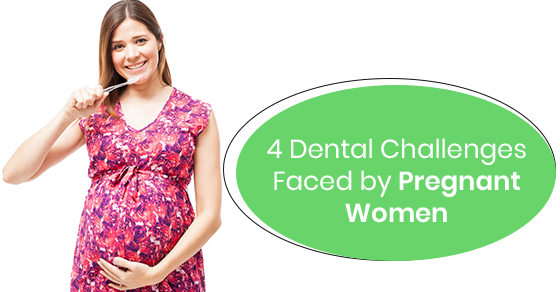Blog

4 Dental Challenges Faced by Pregnant Women
Posted by Dr. Julie Boudreault On 10-06-2020
Dental care is essential to everyone’s good health. We all need strong, healthy teeth and gums at any age. Whether it’s in the early, formative years of childhood when we’re learning good habits, or well into adulthood. But there’s one population that might not be getting the dental care they need — pregnant women in Toronto.
Pregnant women need careful — and even increased — dental care throughout these nine months. Not a lot of people know this, but oral health is overall health. That is, a lot of ailments arise from a lack of proper dental care, which, when pregnant, is often ignored because of more pressing concerns, like the baby’s health.
But that ends now because it’s time women in Toronto learn that pregnancy itself can lead to gum inflammation, which often presents as bleeding gums and other similar infections that can even be passed on through saliva. Don’t risk passing on tooth decay to your baby, and take care of your beautiful smile throughout your pregnancy.
1. Gingivitis in pregnancy
Inflamed or bleeding gums are the first sign of gingivitis, which can quickly develop into periodontal disease, tooth decay, and eventual loss. And if that’s not enough, active tooth decay can spread bacteria that causes cavities, which can be easily passed on to a woman’s baby by the time they’re born. A lack of proper dental care in pregnancy starts a cycle of poor oral health for the entire family.
But how does gingivitis develop in pregnant women? Pregnancy sends the body’s hormones into overdrive. The increased hormone production affects the body’s natural response to plaque or bacteria build-up from food particles left uncleaned. During pregnancy, you’ll need to pay extra attention to your oral health, along with the rest of the body.
2. Nausea and vomiting
Morning sickness — which strikes around the clock — is one of the lesser joys of pregnancy. But did you know that it also impacts dental care? Vomit passes through the mouth and coats the teeth with strong acids. So what are you supposed to do if you can’t keep a meal down?
The basic rule is to rinse your mouth right away and make sure to brush your teeth when your gag reflex has subsided. If you don’t, you risk damage to the tooth enamel and eventually, tooth decay as the acid and plaque stay lodged in the teeth instead of being cleaned.
Here are some helpful tips for getting through each round:
- Don’t brush immediately after vomiting, since teeth enamel are still coated in acids which the vigorous motion of brushing can scratch away; wait an hour after vomiting before you try brushing
- Rinse your mouth regularly with water, followed by a fluoridated mouthwash or toothpaste
- Choose a toothbrush with a small head, and take your time with a slow brushing motion
- If your current toothpaste is provoking your gag reflex, switch to another fluoridated brand or variety
3. Gum disease and premature birth
Research shows that gum disease in pregnant women has been linked to premature babies, often born with low weight. Because they’re born before they’ve fully developed in the womb, premature babies are at high risk of cerebral palsy, as well as eyesight and hearing problems.
Researchers have estimated that up to 18 out of 100 premature births are linked to gum disease — all the more reason for expectant mothers to keep up with dental care during pregnancy.
Dental Care During Pregnancy
With a bundle of joy well on their way, you need to take extra care of your health, including your teeth and gums. For day-to-day oral health that prevents gum disease, it helps to stick to the basics of dental care:
- Brush your teeth with a fluoride toothpaste at least twice a day
- Floss between teeth
- See your dentist for regular check-ups and cleaning
- Stay hydrated with water and swap sugary and acidic treats for fruits and vegetables
How to Handle Food Cravings
Every pregnant woman knows this too well — these 9 months come with a range of food cravings. For a lot of women, however, these can include sweet, sugary treats. These aren’t the healthiest options for a growing baby and pose a risk to dental health due to plaque build-up and cavities. Instead, opt for low-sugar food, such as fruits and vegetables.
If you need to indulge these sugary cravings, do so once in a while, and make sure to rinse your mouth with water or alcohol-free mouthwash to clean the teeth right away.
But more than curbing unhealthy cravings, take this time to strengthen your body. In particular, look into increasing your calcium level — this protects bone mass and ensures that your developing baby’s nutritional needs are met.
High-calcium foods include milk, cheese, and unsweetened yogurt. For a maximum health boost, add vitamin-D rich foods to your diet, as this helps unlock the benefits of calcium. Good sources include fortified margarine, fish like salmon, and eggs.
Tell Your Dentist if You’re Pregnant
Pregnancy affects your overall health, and dental care is no exception to that. Let your dentist in Toronto know that you are pregnant so that they can find alternatives to X-rays, general anesthesia, and other necessary medications.
And while you’re at it, tell your OB-GYN, too, if you’re due for any dental treatment — especially if it’s not urgent — so it can be properly scheduled after the first trimester when it’s safer to do so.
To learn more about the dental issues faced by pregnant women, call Milltown Dental in Toronto at 905-878-8528 or contact us here.

